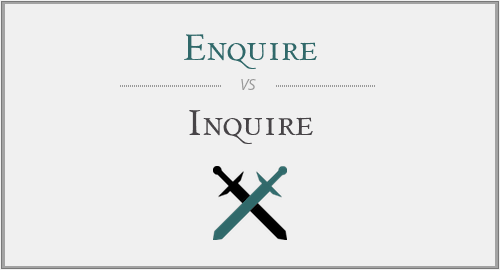She inquired about the library charges.
What do you make from the above sentence? Do you think the word inquired should maybe have started with an e except of an a? If you did, there is nothing wrong with you or your language skills as inquire and enquire are both widely used in English language and are often confused with other. The meanings, usage and difference between the two words are described below.
Inquire as verb:
Inquire is a commonly used verb in both official and unofficial circumstances where it implies to ask for some information from someone. The proprietor in inquired about the cottage prices. To ask about the health and well-being of someone, you inquire them. Angela inquired about her friend’s parents after the party. When a person asks to see or speak to another person, he/she inquires about them.
That was Mr. Paul enquiring for you, I told him he couldn't come in.
An investigation or a look into done by the investigators or police officers from a witness or a possible subject is called inquiry. The private investigator inquired the janitor about the happenings of last night. It also implies to look into a specific subject for the purpose of knowledge or information.
The task of political sociology is to enquire into the causes of political events.
Enquire as verb:
Originated from the Old French enquerre which means ‘to seek’, enquire is used in all the situations where inquire is utilized. In other words, enquire is another form of inquire.
The traditional distinction between the verbs enquire and inquire is that enquire is to be used for general senses of ‘ask’, while inquire is reserved for uses meaning ‘make a formal investigation’. There is one qualification to this. Some Britons make the distinction that enquire and its derivatives apply to informal queries, and inquire and its derivatives to formal investigations. In practice, however, enquire, and the associated noun enquiry, are more common in British English while inquire (and the noun inquiry) are more common in American English, but otherwise there is little discernible distinction in the way the words are used.

Examples:
Gratl told the inquiry earlier that the federal government’s application is too broad. (Vancouver Sun)
A criminal inquiry into phone-hacking at the News of the World could be reopened and staff prosecuted following legal action by some of its alleged victims. (Guardian)
Talks not serious, but Rockies inquire about Rangers all-star Young (Denver Post)
One of the vintner’s shareholders sought to inquire about a wallaby pictured among the vine. (Sydney Morning Herald)
Peering at me, he enquires casually: “They don’t applaud at the end of a film in the cinema very often these days, do they?” (The Guardian)
Redmayne, always assiduously polite and attentive, enquires and finds my situation has changed, too – though no Oscar yet. (The Guardian)
"I have always had an enquiring mind so I know I will be inspired by the great houses we visit," she said. (BBC)
Inquire or Enquire:
All there is to know about these two words is that they both mean the same thing that is question or seek something. Enquire with an e is more common in British English while, inquire with an I is widely used in American English. If you are a proud Brit you might also want to use the inquire for formal inquiries and enquire for casual ask outs.
Are you still inquiring about the difference between the words enquire and inquire?




Have a discussion about this article with the community:
Report Comment
We're doing our best to make sure our content is useful, accurate and safe.
If by any chance you spot an inappropriate comment while navigating through our website please use this form to let us know, and we'll take care of it shortly.
Attachment
You need to be logged in to favorite.
Log In